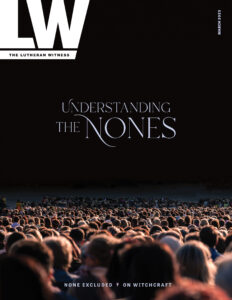Whenever someone asked about the topic of this issue, I would say, “the Nones,” and then crack a joke about “nuns.” But the more I wrote and edited, the deeper I dug into the issue, the less of a joke it became. Recent statistics on those who mark “None” on religious preference surveys indicate that almost every Christian family in America today has been touched by the trend toward disaffiliation.
The trend is happening before our eyes. The February 2022 issue of The Lutheran Witness offered an introduction to the topic. As that article noted, the Nones are the fastest-growing religious group in America. While they do not outnumber Christians on the whole in the U.S., they do outnumber any single denomination. It behooves us as the church to prepare our children more effectively to meet this reality and learn to speak with those who have joined the ranks of the unaffiliated about the love of God in Christ for sinners.
The discussion with and about those who have disaffiliated from the church is particularly painful for a number of reasons. As Luther says in his explanation of the Third Commandment, refusing to hear the preaching of God’s Word is sin. The one who does so despises God’s Word. In this sense, we can and do say that there is no salvation outside the church, for God creates and sustains faith by His preached Word and the Sacraments delivered in His Divine Service. Seeing loved ones disaffiliate from the church, from the place of God’s forgiveness, is painful and uncomfortable. We want to speak God’s truth, and yet we fear that speaking with them might drive a wedge even further between them and the church.
It is also painful as we see our own failures in the growth of the Nones. Would things have been different if we had spent more time in family devotions or reading the Bible with our children? We must repent of these sins and fall on the grace of God. Then, as we have opportunity, we continue to offer a Lutheran witness of Christ’s redeeming work to all.
To that end, this issue of The Lutheran Witness will help you understand a bit of where the Nones come from and how they think. Along with the trend toward disaffiliation has also come an increased interest in witchcraft and the occult, as Jon Furgeson explains in his article. Peter Burfeind examines how many Nones — though certainly not all — tend to place their fear, love and trust in the government. Finally, the primary tool given to parents and grandparents for protecting their children is the Word of God. Joshua Hayes offers some suggestions for making regular home devotions a part of your daily life. I pray this issue will both guide and comfort you in your discussions with the Nones near you.
In Christ,
Roy S. Askins
Managing Editor, The Lutheran Witness







